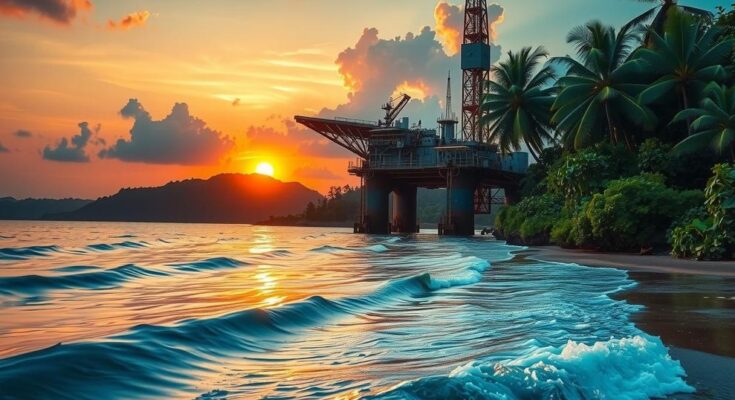President Lula’s support for oil drilling at the Amazon’s mouth contradicts his commitment to climate leadership. Critics argue that this decision risks severe environmental harm and jeopardizes Indigenous rights. The auctions of new oil blocks could undermine Brazil’s climate goals ahead of the COP30 summit, raising alarm among activists and environmentalists who advocate for ecological preservation over fossil fuel expansion.
Brazilian President Luiz Inácio Lula da Silva is advocating for oil drilling at the mouth of the Amazon River, despite significant climate concerns. Lula asserts that the revenue generated will support Brazil’s energy transition toward renewables; however, critics contend this rationale is deeply flawed and masks the true expansions of oil extraction. They emphasize that such projects could lead to substantial environmental degradation, threaten biodiversity, and impact Indigenous peoples in the region.
Activists express alarm over the potential approval of oil exploration projects, fearing it could pave the way for further fossil fuel endeavors, which would exacerbate environmental risks. Brazil’s petroleum agency is set to auction over 300 oil blocks, including 47 in the Amazon’s mouth, raising concerns about the adverse implications of these decisions on global climate commitments.
This initiative starkly contrasts with Lula’s prior image as a climate leader, especially as Brazil prepares to host the U.N. climate summit COP30. Critics such as Kumi Naidoo argue that the government is attempting to disguise its detrimental decisions as part of global climate efforts, ultimately seeking to expand oil industry influence in crucial biodiversity regions.
COP30 President André Corrêa do Lago defended the plan, claiming there is no inconsistency between hosting the climate summit and pursuing oil exploration, reiterating Brazil’s commitment to its net-zero goals. Lula has responded to criticisms by suggesting that Brazil deserves to pursue resource-based economic growth, akin to its neighboring countries, emphasizing a perceived inequality in resource exploitation.
The environmental agency, IBAMA, currently possesses the authority to approve the exploratory drilling licenses. It previously rejected Petrobras’ proposal, although this decision is now under review without a specified timeline for resolution.
Environmentalists warn that permitting such projects could undermine Brazil’s climate progress, reversing gains made in reducing Amazon deforestation and increasing emission reduction targets. This potential drilling could emit greenhouse gases sufficient to negate these important environmental achievements, according to research findings.
The political landscape has shifted, with the election of Davi Alcolumbre, a pro-oil senator, leading Lula to intensify pressures on IBAMA to favor the oil company’s interests while attempting to persuade the Environment Minister of the project’s merits.
Lula’s push for oil drilling in the Equatorial Margin is highly controversial due to the area’s rich biodiversity and potential threats to local Indigenous communities. Activists warn of catastrophic environmental impacts should oil spills occur, significantly jeopardizing community livelihoods and ecosystems.
Indigenous organizations also highlight the absence of consultation with affected communities, violating international agreements that protect Indigenous rights. Critics stress the necessity for proper engagement to avoid irreversible harm from corporate activities in their territories.
Petrobras estimates significant oil reserves in the Equatorial Margin, potentially adding to Brazil’s output and export capabilities. However, environmental advocates argue that prioritizing oil exploration undermines Brazil’s climate goals, especially as the country faces increasing climate-related disasters.
Should IBAMA grant approval for exploratory drilling, it may encourage an influx of further oil exploration projects within the sensitive Amazon region, risking local communities and ecosystems. Anti-extraction sentiment amongst environmentalists prioritizes the need for coordinated global action to mitigate climate crises over fossil fuel expansion.
President Lula’s push for oil exploration at the Amazon’s mouth raises significant environmental concerns, challenging his climate leadership image. Critics argue that reliance on oil revenue undermines genuine efforts toward renewable energy transition. The approval of exploration licenses could threaten biodiversity, Indigenous communities, and the overall climate agenda just as Brazil prepares for the COP30 summit, marking a pivotal moment for the nation’s environmental policy.
Original Source: news.mongabay.com




